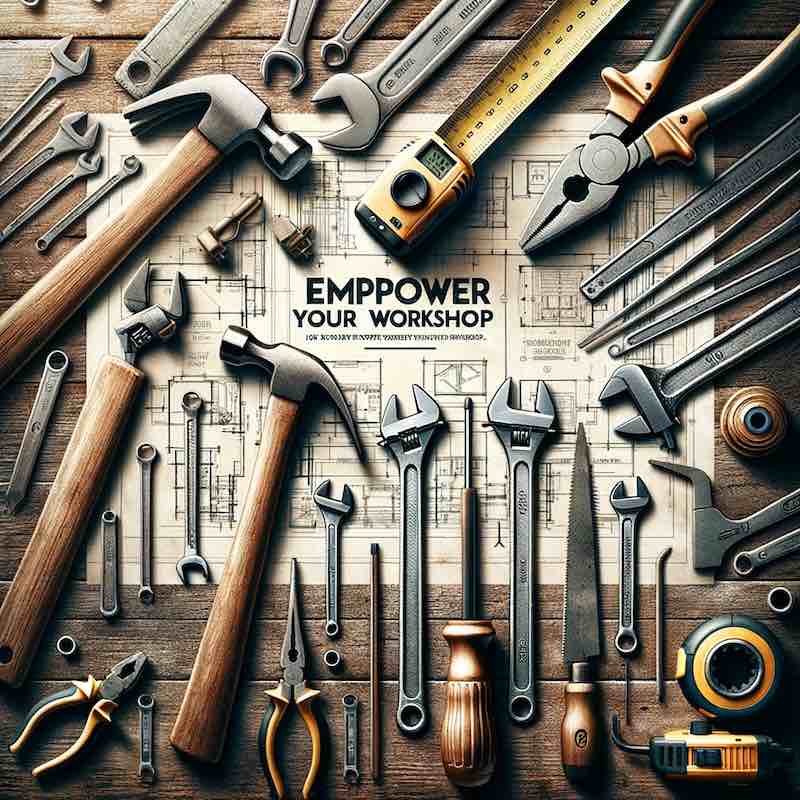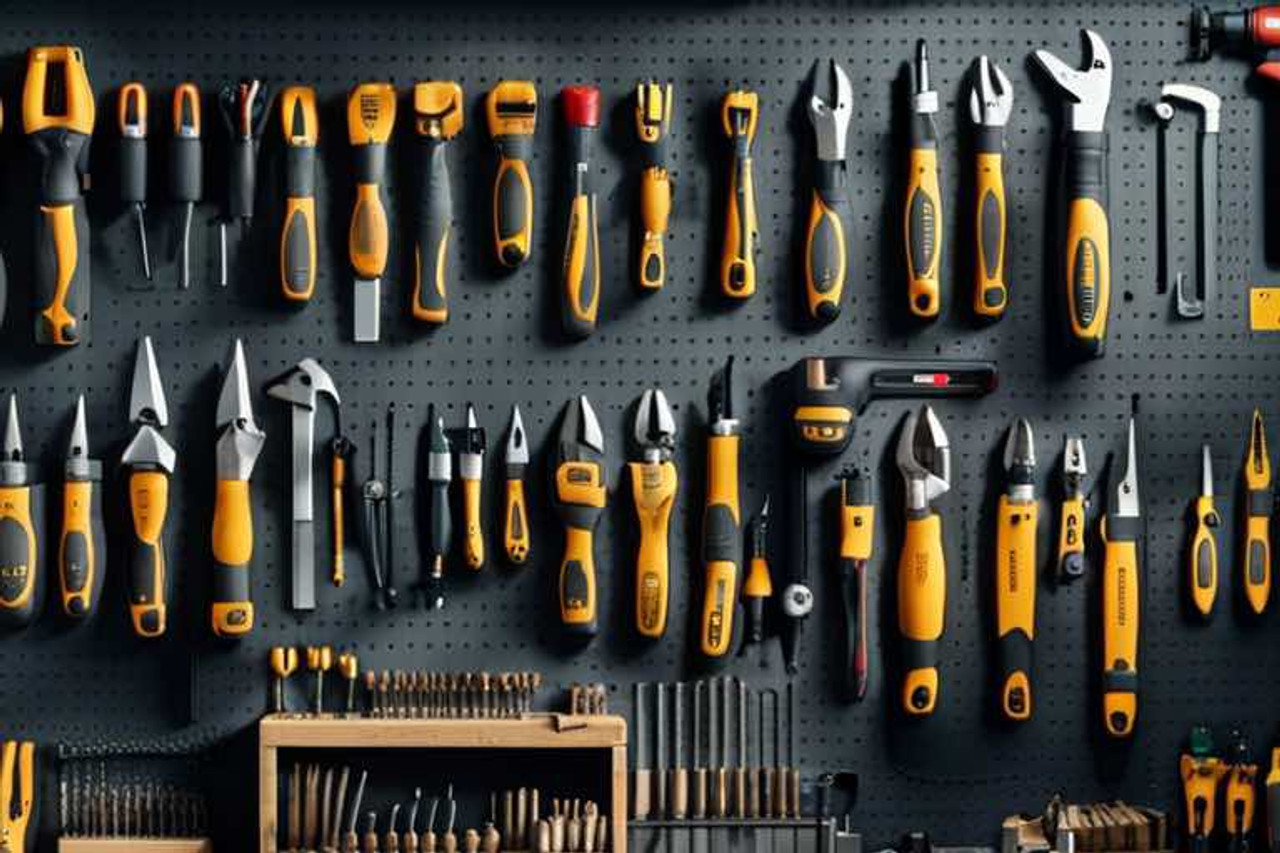Empower Your Workshop with These Ten Must Have Hand Tools
Empower Your Workshop
Do you need help with outdated, ineffective hand tools in your workshop? Do you dream of working precisely and efficiently, achieving professional-level results every time? Look no further! This blog will empower your workshop with ten must-have hand tools to revolutionize your DIY projects. Whether you're a seasoned pro or just starting your journey, these tools will help you tackle any task with confidence and efficiency. Unlock the power of the ten essential hand tools every workshop needs. From beginners to pros, learn about the must-haves that boost efficiency, safety, and precision. Dive into our guide and transform your DIY projects!
Throughout this informative blog, we will delve deep into the world of hand tools, providing insider tips, expert advice, and recommendations for the best tools on the market that every workshop should also have in their tool chest; it is a little different from the types of hand tools for every job and for every workshop as it suggests just ten tools that every workshop should have. Say goodbye to frustration and hello to productivity as we guide you through the essentials every workshop should have.
Highlights of what you'll discover:
1. The importance of quality hand tools for optimal performance.
2. A comprehensive list of your workshop's top 10 must-have hand tools.
With these essential hand tools, get ready to unleash your creativity and take your projects to new heights.

Table Of Contents.
- Essential Hand Tools for Every Workshop
- Hammer - The Versatile Tool for Various Tasks
- Screwdrivers - A Must-Have for Any Toolbox
- Pliers - The Handy Grip for Diverse Jobs
- Tape Measure - Accurate Measurements for Precision
- Wrenches - Essential for Fixing and Adjusting
- Chisels - Perfect for Shaping and Carving
- Handsaw - Ideal for Cutting Wood and More
- Level - Achieving Balance and Accuracy
- Clamps - Vital for Holding Pieces Together Securely
- Safety Gear - Protecting Yourself in the Workshop
When setting up a workshop, having the right-hand tools is crucial. These essential tools help you get the job done efficiently and ensure the quality of your work. Whether a seasoned professional or a DIY enthusiast, these must-have hand tools will empower your workshop and make your projects a breeze.
1. Claw Hammer: A claw hammer is a type of hammer and a classic tool every workshop should have. It's versatile and can be used for various tasks, including driving nails, removing nails, and general construction work. Look for a hammer with a comfortable grip and a balanced weight for better control and reduced strain on your hand.
2. Screwdrivers: Screwdrivers come in various sizes and types; having a set of them is essential for any workshop. From Philips head to flathead screwdrivers, they tighten or loosen screws in various applications. Invest in a quality set with magnetic tips for better convenience and efficiency.
3. Adjustable Wrench: An adjustable wrench is a must-have tool for working with nuts, bolts, and plumbing fixtures. It allows you to adjust the opening size to fit different fasteners, eliminating the need for multiple wrenches. Look for a wrench with a comfortable grip and smooth adjustment mechanism.
4. Pliers: Pliers are versatile tools that are handy for gripping, twisting, cutting, and bending wires or metal objects. Needle-nose pliers are ideal for working in tight spaces, while lineman's pliers are great for heavy-duty applications. Adding a pair of locking pliers to your collection is also beneficial for securing objects in place.
5. Tape Measure: Accurate measurements are crucial in any workshop, and a tape measure is a tool you simply can only do with. Look for a tape measure with metric and standard units, a sturdy lock mechanism, and durable housing. This tool will ensure precise cuts and proper fitment in your projects.
6. Utility Knife: A utility knife is a versatile cutting tool that can be used for various tasks, such as opening packages, stripping wires, or even scoring materials. Choose a utility knife with a retractable blade and a comfortable handle for safety and ease of use. Remember to replace the blade regularly for optimal performance.
7. Chisels: Chisels are essential tools for woodworking and sculpting. They allow you to shape, carve, and remove material with precision. Invest in
Safety Gear - Protecting Yourself in the Workshop
When it comes to working in a workshop, safety should always be a top priority. While hand tools are essential for getting the job done, protecting yourself from potential hazards is equally important. Here are some essential safety gear items that should be on your must-have list:
2. Ear Protection: Power tools and machinery can generate high levels of noise that can cause hearing damage over time. Wearing ear protection such as earplugs or earmuffs will help reduce the risk of hearing loss and allow you to work comfortably in a noisy environment.
3. Respirator/Mask: A workshop can be filled with dust, chemicals, and fumes that can harm your respiratory system. This is where a respirator or mask comes in handy. It will filter out harmful particles and ensure you breathe clean air while working.
4. Work Gloves: Your hands are often involved in the most labor-intensive tasks in the workshop, making them susceptible to cuts, burns, and scrapes. For optimal protection, use work gloves suitable for your specific job, whether it's handling sharp objects or working with chemicals.
5. Protective Clothing: Proper clothing can prevent accidents and protect you from spills, sparks, and other hazards. Opt for garments made from flame-resistant materials, or wear an apron to protect your body from hot substances or sharp tools.
6. Safety Shoes: Your feet risk being injured by heavy objects or falling tools. Invest in safety shoes with steel toes and nonslip soles to protect your feet from crushing injuries and improve your grip on slippery surfaces.
7. Dust Masks: Woodworking and other workshop activities can generate significant dust. Breathing in this dust can lead to respiratory problems and allergies. Wearing a dust mask can minimize the risk of inhaling harmful particles and keep your lungs healthy.
8. First Aid Kit: Accidents can happen despite taking all the necessary precautions. Having a fully stocked first aid kit in your workshop will ensure that you can promptly and effectively treat any minor injuries that may occur.
9. Fire Extinguisher: Fires can quickly escalate in a workshop, making it essential to have a fire
In conclusion, equipping your workshop with the right-hand tools can make all the difference regarding efficiency and productivity in the world. By having these essential tools on hand, you'll be able to handle any project that comes your way quickly. Whether you're a seasoned DIY enthusiast or just starting out, having reliable hand tools is crucial. From hammers and screwdrivers to wrenches and pliers, each tool serves a unique purpose and can help you tackle various tasks. Not only are these hand tools a practical investment, but they can also save you time and money in the long run. Instead of relying on a professional for every repair or project, you can confidently take matters into your own hands. Ready to upgrade your workshop arsenal? Visit Tendsupplies.com for top-notch hand tools and expert advice. Equip your workspace with the best tools today!"
FAQ
What are the essential hand tools for a workshop?
A good Hammer, Chisel, Saw, Drill, screwdriver, Tape Measure, Level, and Square are essential hand tools for a workshop.
What are the worst hand tools for a workshop?
The worst hand tools for a workshop are hard to grip and control, such as saws and axes. These tools are challenging and can cause injuries if not used properly.
What are the best hand tools for a workshop?
The best hand tools for a workshop are versatile and easy to use. These tools should be able to handle various tasks, be lightweight, and be easy to clean.
What are the worst tips for using hand tools?
Some of the worst tips for using hand tools include: Holding the device incorrectly can cause unnecessary strain on your hand and arm. Refrain from trying to force the tool into tight spaces. Always wear gloves when using a saw, chisel, or other sharp tools.
What are the best tips for using hand tools?
When using hand tools, it is essential to take the time to master the basics. Here are some tips to help you get started: Always use a spirit level to ensure your work is level. ... Make sure your hands are adequately warmed up before starting a project. ... Bend your fingers so that you can use a saw or a hammer correctly. ... Keep your tools sharpened and in good condition.
What are the best tips for using hand tools?
Here are a few tips to get the most out of your hand tools: Use a light grip. Keep your hand close to the tool, with the fingers spread slightly. Keep your fingers pointed down. This will help you to control the tool more easily. Use a straight arm. For example, keep your arm straight from the shoulder to the hand holding the saw blade if you're using a table saw. This will minimize blade wobble.
What are the worst tips for using
The worst tips for using hand tools are the ones that cause the most damage and inconvenience. Follow these tips to avoid these common mistakes: -Wear gloves when using the tool. -Apply the tool in a controlled, even motion. -Start slowly and gradually increase the pressure as you become familiar with the tool. -Stop using the tool if you feel any pain or if the tool starts to slip.
What are the best tips for using hand tools?
Always use a guard. This will protect your hands from debris and sharp edges. Keep your hands well-hydrated. Dehydration can lead to cramps and fatigue. Wear a good quality safety glove. It will protect your hands from chemicals and other potential hazards. Use the right tool for the job. There are better tools for cutting wood than a sawzall. Keep your hand tools sharp. Dull tools can lead to injuries. Store your hand tools safely. Hand tools should be stored where they will not cause a hazard. Use your hand tools regularly. They will eventually become dull and dangerous if you don't use them.
Readers also like









